Hiccups, we’ve all experienced them at some point in our lives. Those pesky involuntary spasms of the diaphragm can disrupt our conversations, meals, and even sleep. While hiccups are usually harmless and temporary, they can be downright annoying! So, if you’re tired of being interrupted by these hiccuping fits, you’ve come to the right place.
In this blog post, we’ll explore the causes of hiccups and provide you with a comprehensive guide on how to get rid of Hiccups! From simple breathing techniques to surprising remedies, we’ve got your back (and your diaphragm) covered. So let’s dive in and discover the secrets to conquering those stubborn hiccups – no holding your breath required!
What Causes Hiccups?

Hiccups are involuntary contractions or spasms of the diaphragm muscle, which is responsible for your breathing. The diaphragm suddenly contracts, causing an abrupt intake of breath that is then abruptly stopped by the closure of your vocal cords. This closure produces the “hic” sound associated with hiccups.
The exact cause of hiccups is not always known, but there are several common triggers and underlying factors that can contribute to their occurrence:
- Eating or drinking too quickly: Consuming food or beverages rapidly can lead to swallowing air, which may irritate the diaphragm and trigger hiccups.
- Eating spicy or hot foods: Spicy or hot foods can irritate the nerves that control the diaphragm, leading to hiccups.
- Consuming carbonated drinks: Drinking carbonated beverages can also cause hiccups due to the release of carbon dioxide gas in the stomach, which can irritate the diaphragm.
- Changes in temperature: Sudden exposure to extreme temperatures, such as eating or drinking something very hot or very cold, can stimulate the nerves that control the diaphragm and result in hiccups.
- Swallowing air: Engaging in habits like chewing gum, smoking, or using a straw can cause you to swallow excess air, which may contribute to hiccups.
- Emotional factors: Strong emotions, such as excitement, stress, or anxiety, can sometimes trigger hiccups due to their effects on the nerves involved in breathing.
- Irritation of the diaphragm: Certain medical conditions or procedures that irritate the diaphragm, such as acid reflux, pneumonia, or abdominal surgery, can lead to hiccups.
Most cases of hiccups resolve on their own within a short period of time. However, if you experience persistent or chronic hiccups that last for more than 48 hours, it’s recommended to consult a healthcare professional for evaluation and possible treatment options.
How to Get Rid of Hiccups?
1. Hold Your Breath
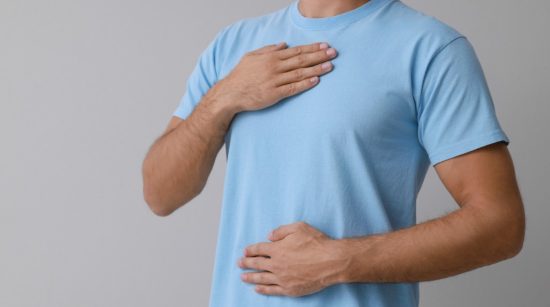
One of the most common home remedies for hiccups is holding your breath. It may sound simple, but taking a deep breath and holding it can actually help stop those pesky hiccups in their tracks.
When you hold your breath, the carbon dioxide levels in your body increase. This increase in carbon dioxide can stimulate the diaphragm muscle and interrupt its spasms, which are the cause of hiccups.
To try this method, take a deep breath and hold it for as long as you comfortably can. Focus on filling your lungs with air and holding it in without straining yourself. You can repeat this process a few times if needed until the hiccups subside.
While holding your breath may not work for everyone or every type of hiccup episode, it’s worth giving it a try when you’re desperate to find relief from those annoying hiccups. So next time you feel them coming on, take a deep breath and give this technique a shot!
2. Drink Water

Drinking water is a simple and effective method to get rid of hiccups. When you take small sips of water without pausing between sips, it can help stimulate the nerves in your throat. This stimulation can then ease the diaphragm muscle spasms that are causing those annoying hiccups.
The key here is to drink the water slowly and continuously, without any breaks. By doing so, you allow the nerves in your throat to send signals to your brain, which can help interrupt the hiccup reflex.
Not only does drinking water offer a quick and easy solution for hiccups, but it’s also readily available in most cases. Whether you have a glass of water nearby or need to grab one from the kitchen or office cooler, this remedy is convenient and accessible.
So next time you find yourself dealing with an unexpected about of hiccups, reach for that glass of water and start taking small sips without pausing. It may just be the trick needed to put an end to those pesky spasms!
3. Swallow Granulated Sugar
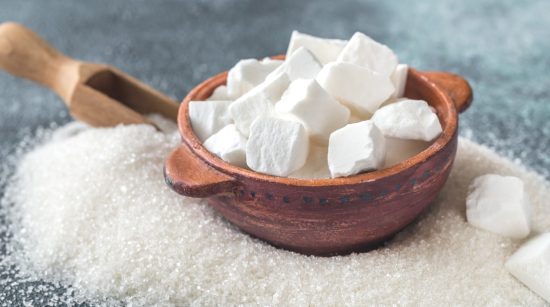
One interesting and unconventional method to get rid of hiccups is by swallowing granulated sugar. Yes, you read that right! This simple remedy involves placing a teaspoon of granulated sugar on the back of your tongue and allowing it to melt slowly.
But how does this actually work? Well, it’s believed that the act of swallowing the sugar stimulates the vagus nerve, which plays a role in controlling several bodily functions, including hiccups. By stimulating this nerve, it may help suppress the spasms in your diaphragm muscle that are causing those annoying hiccups.
While there isn’t much scientific evidence to support this method, many people swear by its effectiveness. It’s worth giving it a try if other remedies have yet to work for you.
So, next time you’re battling with persistent hiccups, reach for some granulated sugar and give this unique trick a shot. Who knows? It is the solution you’ve been looking for!
4. Perform a Valsalva Maneuver

Performing a Valsalva manoeuvre is another technique that may help get rid of hiccups. It involves taking a deep breath, closing your mouth, pinching your nose shut, and then exhaling forcibly. By doing this, you increase the pressure in your chest, which can reset the diaphragm muscle.
The Valsalva manoeuvre is commonly used to equalize pressure during activities like scuba diving or flying. However, it can also be effective in stopping hiccups. This technique interrupts the hiccup reflex by altering the way your muscles contract.
When you perform the Valsalva manoeuvre, you are creating resistance against airflow from your lungs. This increased pressure in your chest stimulates certain nerves and muscles involved in breathing, including those connected to the diaphragm muscle responsible for hiccups.
It’s important to note that while the Valsalva manoeuvre may work for some individuals experiencing hiccups, it may not be effective for others. Hiccup remedies vary from person to person because everyone’s body reacts differently.
5. Gargle with Cold Water
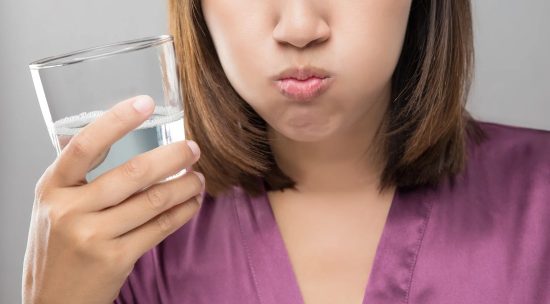
One simple and refreshing method to try when you have hiccups is gargling with cold water. It sounds unusual, but the shock of the chilly temperature can help interrupt the hiccup reflex.
To give it a go, start by taking a sip of ice-cold water. Then, tilt your head back slightly and let the water sit in your mouth for a few seconds. As you gargle, feel the coolness spreading down your throat.
The theory behind this technique is that the sudden change in temperature stimulates your body’s vagus nerve, which plays a role in regulating hiccups. The sensation of cold on your throat may disrupt the spasms of your diaphragm muscle and effectively put an end to those pesky hiccups.
While this method works for some people, it might not be effective for everyone. But since it’s such an easy and harmless remedy to try, there’s no harm in giving it a shot!
6. Distract Yourself

When hiccups strike, sometimes the best solution is to distract yourself. Engaging in an activity that mentally diverts your attention can help alleviate those pesky spasms. One simple technique is to count backwards from 100. As you focus on the numbers, your mind becomes occupied and may interrupt the hiccup reflex.
Another effective distraction method is solving a puzzle. Whether it’s a crossword, Sudoku, or even a jigsaw puzzle, challenging your brain can shift your focus away from hiccups and onto something more engaging. The act of problem-solving stimulates different areas of your brain and may provide relief from those persistent hiccups.
If puzzles aren’t your thing, try engaging in a creative task like drawing or painting. By immersing yourself in artistry, you channel your energy into a productive outlet while diverting attention away from hiccups.
Remember that everyone is unique when it comes to finding distractions that work for them. Experiment with different activities until you find one that successfully redirects your focus and helps put an end to those bothersome hiccups!
7. Apply Gentle Pressure
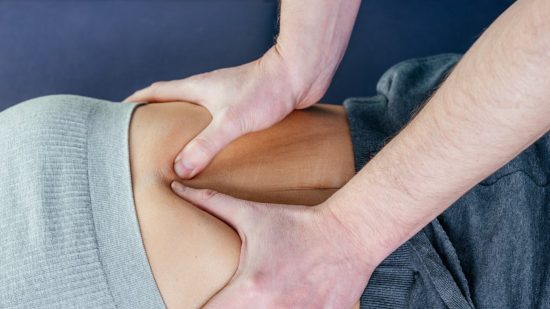
One technique that may help to get rid of hiccups is applying gentle pressure on your diaphragm. The diaphragm is a dome-shaped muscle located just below your ribcage and is responsible for controlling your breathing. By pressing down gently on this area, you can relax the muscles and alleviate the hiccups.
To apply gentle pressure on your diaphragm, place your hand flat against your abdomen, just below the sternum. Apply light pressure with your fingertips and hold it for a few seconds. You can also lean forward slightly while pressing down on this area.
This method works by stimulating the phrenic nerve, which controls the movement of the diaphragm. Applying gentle pressure can help interrupt and reset any spasms or irregular contractions that may be causing the hiccups.
It’s important to note that everyone’s body is different, so this technique may only work for some. However, it’s worth giving it a try as one of many possible solutions to get rid of hiccups quickly and naturally.
8. Breathe into a Paper Bag
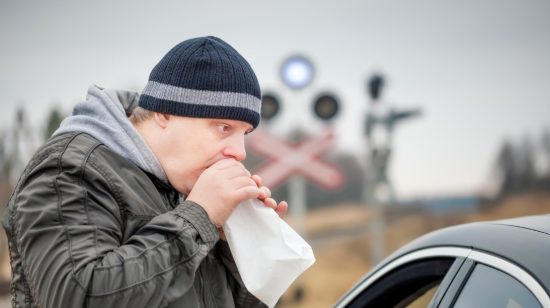
The unconventional method that some people swear by for getting rid of hiccups is breathing into a paper bag. While it may sound strange, the idea behind this technique is to increase the carbon dioxide levels in your body and help regulate your breathing pattern.
To try this method, find a small paper bag and hold it tightly around your mouth and nose. Take slow, deep breaths in and out, focusing on inhaling through your nose and exhaling through your mouth. The theory is that by doing this, you are rebalancing the levels of oxygen and carbon dioxide in your body.
It’s important to note that this technique may only work for some, as individuals respond differently to various hiccup remedies. Additionally, be cautious when using a paper bag – make sure it’s clean and without any potential hazards.
While there isn’t scientific evidence supporting the effectiveness of breathing into a paper bag for hiccup relief, some individuals have found success with this method. It’s always worth trying if you’re desperate to stop those pesky hiccups!
| Methods | Instructions |
| Hold Your Breath |
Take a deep breath, hold it, and focus on interrupting the diaphragm spasms causing hiccups. Repeat if needed for relief.
|
| Drink Water |
Sip water continuously without breaks to stimulate throat nerves and ease diaphragm muscle spasms responsible for hiccups.
|
| Swallow Granulated Sugar |
Place a teaspoon of granulated sugar on your tongue to stimulate the vagus nerve and potentially suppress hiccup reflex.
|
| Perform a Valsalva Maneuver |
Inhale, close mouth, pinch nose, then exhale forcibly to reset diaphragm muscle by increasing pressure in the chest.
|
| Gargle with Cold Water |
Gargle ice-cold water to shock the vagus nerve with a sudden temperature change, potentially halting diaphragm muscle spasms.
|
| Distract Yourself |
Engage in activities like counting backward, solving puzzles, or doing art to mentally divert attention and alleviate hiccups.
|
| Apply Gentle Pressure |
Press gently on the diaphragm area below the ribcage to relax muscles and stimulate the phrenic nerve, aiding in hiccup relief.
|
| Breathe into a Paper Bag |
Breathe into a small paper bag to rebalance oxygen and carbon dioxide levels, potentially regulating breathing patterns and stopping hiccups.
|
Prevention Tips for Hiccups
Now that you know how to get rid of hiccups when they strike, let’s talk about some preventive measures you can take to minimize their occurrence. While hiccups are often harmless and temporary, it’s always better to avoid them altogether if possible.
- Eat Slowly: Avoid hiccups by chewing food thoroughly and eating at a slower pace.
- Avoid Carbonated Drinks: Skip fizzy beverages, as bubbles can irritate the diaphragm and trigger hiccups.
- Limit Alcohol: Moderating alcohol intake can help prevent alcohol-induced hiccups.
- Manage Stress: Practice stress-reducing activities like relaxation techniques and regular exercise.
- Maintain a Healthy Diet: Steer clear of trigger foods such as spicy, hot, acidic, or overly fatty meals to reduce the risk of hiccups.
By incorporating these preventative measures into your lifestyle habits, you’ll be one step closer to minimizing those pesky hiccup episodes!
When to Seek Medical Attention?
When it comes to hiccups, most of the time they’re harmless and go away on their own. However, there are instances where seeking medical attention is necessary. If you experience hiccups that last for more than 48 hours and occur with severe abdominal pain, vomiting, fever, or difficulty swallowing, it’s crucial to consult a healthcare provider.
Additionally, if your hiccups are disrupting your daily life, affecting your ability to eat or sleep, or are accompanied by chest pain, it’s recommended to seek medical help. Certain underlying medical conditions such as nerve damage, gastrointestinal issues, or respiratory problems could be causing persistent hiccups, and a doctor’s evaluation may be necessary to determine the root cause and provide appropriate treatment.
So, if your hiccups are prolonged, severe, or concerning in any way, don’t hesitate to reach out to a healthcare professional for guidance and support.
Conclusion
Hiccups can be an annoying and disruptive experience, but thankfully, there are several effective methods to get rid of them. From holding your breath and drinking water to performing a Valsalva manoeuvre or swallowing granulated sugar, these techniques target the underlying cause of hiccups and help alleviate them.
Prevention is also key in managing hiccups. Avoiding triggers such as eating too quickly, consuming carbonated beverages, or overeating can minimize the occurrence of hiccups. It’s essential to take small sips of water while eating and chew your food thoroughly to prevent air from being swallowed.
Remember that everyone’s body may respond differently to these remedies, so it’s important to find what works best for you. If your hiccups persist for an extended period or become chronic, it’s advisable to consult a healthcare professional for further evaluation and guidance.
So the next time you find yourself plagued by those pesky hiccups, try out these natural remedies and hopefully bid farewell to those unwelcome spasms!
FAQs – How to Get Rid of Hiccups?
Why can’t I stop hiccuping?
Hiccups stem from involuntary diaphragm contractions. Triggers can be sudden changes in temperature, eating too fast, or emotional stress. Sometimes, no obvious cause exists.
How long do hiccups last?
Most hiccups resolve within minutes, but they can last hours, days, or even weeks in rare cases. If they persist for more than 48 hours, seek medical advice.
Is water good for hiccups?
Sipping cold water slowly may help, but avoid gulping, which can trap air and worsen things. Drinking ice water or sucking on an ice cube might also work.
Should I ignore hiccups?
In most cases, Hiccups are innocuous and pass quickly. On the other hand, hiccups that continue for more than 48 hours may point to a health issue. Should they cause disturbances to your eating, sleeping, or everyday routine, see a doctor.

